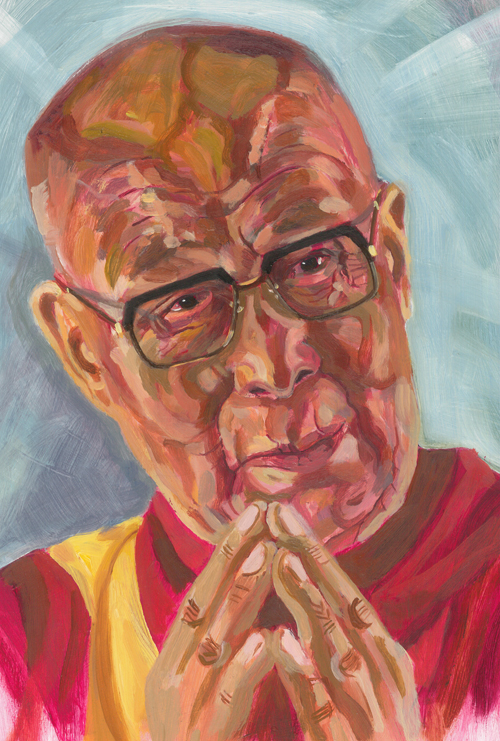
Your complimentary articles
You’ve read one of your four complimentary articles for this month.
You can read four articles free per month. To have complete access to the thousands of philosophy articles on this site, please
Books
An Appeal to the World by His Holiness the Dalai Lama
Ian Robinson has a brief look at the Dalai Lama’s brief message to the world.
It is with considerable diffidence and not a little humility that I embark on a review of a book written by the Dalai Lama. It’s a bit like reviewing God, or the Queen. This is a man who has spent many hours every day for over seventy years meditating on the human condition, contemplating the complexity and simplicity of the world, seeking out the truth of existence. Who am I to sit in judgement on his conclusions?
Given this, it comes as a great relief to discover that in this book the Dalai Lama reaches exactly the same conclusion I have. That conclusion is stated baldly in the opening paragraph: “For thousands of years, violence has been committed and justified in the name of religion. … For that reason I say that in the twenty-first century, we need a new form of ethics beyond religion. I am speaking of a secular ethics.” Amen to that!
While there is nothing particularly original in this notion, what is startling is that a recognition of the limitations of religion and a valorising of secular ethics should come from such a prominent religious leader. It would be refreshing if the leaders of other faiths could see beyond the confines of their own religions and work towards finding a basis for a common ethics that could help bring peace and prosperity to the world.

The Dalai Lama by Darren McAndrew, 2019
For the Dalai Lama, the basis of such an ethics is “our fundamental human spirituality”; that is, “the affinity we humans have for love, benevolence, and affection – no matter what religion we belong to.” He points out that: “we are born without religion, but not without the basic need for compassion… Regardless of whether or not we belong to a religion, we all have a fundamental and profoundly human wellspring of ethics within ourselves. We need to nurture that shared ethical basis.” There is no doubt that such an outcome is fervently to be desired. However the crucial question is, how do we get there from here?
The Dalai Lama recognises that the world is currently plagued by “egoism, nationalism and violence”, and argues that the best way to counter this is to “sharpen our awareness” through “more listening, more contemplation, more meditation.” He leads by example. He practices meditation four hours a day, and claims: “Through intensive meditation, we will find our enemies can become our best friends.” Hmmm… It’s certainly interesting to imagine what the word would be like if everyone spent four hours (or even just one hour) meditating each day. In a First World dominated by commercial imperatives, and a Third World dominated by survival imperatives, this practice, however meritorious, seems unlikely to become a mass movement. But each person is entreated to individually begin the transformation in their own life. In this regard, His Holiness enlists the well-known adage: ‘Be the change you want to see in the world’. (He misattributes the quote to Mahatma Gandhi. The first verified articulation of it was in 1974 by US educator Arleen Lorrance, who wrote, “be the change you want to see happen.” The closest Gandhi ever came to it was in 1913, when he wrote, “If we could change ourselves, the tendencies in the world would also change.”)
The Dalai Lama’s appeal to the world for secular ethics is rounded out with timely entreaties to take climate change seriously, and for arms control and disarmament. Nevertheless the entire statement takes up only seven pages. While this is a beautifully succinct and articulate expression of the Dalai Lama’s thesis, it does not a book make. To expand the tome into publishable length, a long interview with the Dalai Lama by German writer Franz Alt is included. This interview is a good encapsulation of all the Tibetan leader’s key ideas on the principle topics that have concerned him over the years. They range from the sublime (spirituality, compassion, happiness) to the pressing (the refugee crisis, gender equality – he agrees the next Dalai Lama could be a woman – and the future of Tibet) to the mundane (Donald Trump). If you want an excellent summary of his wide-ranging thought, you could not find a better source than this.
This is not a long book, but its merit is in quality rather than quantity. The Dalai Lama is one of the seminal thinkers of our time, and this book demonstrates time and time again why his ideas are always worth attending to in so many areas of human endeavour.
© Ian Robinson 2019
Ian Robinson, President Emeritus of the Rationalist Society of Australia, has been a philosophy tutor at the University of Melbourne, and was given his personal meditation mantra during a one-to-one audience with the late Maharishi Mahesh Yogi.
• An Appeal to the World: The Way to Peace in a Time of Division, by His Holiness the Dalai Lama, with Franz Alt, William Collins, 2017, 126 pages, ISBN 978-0-00-827842-7









